AI’s transformation of work habits, mindset and lifestyle
Personalized AI systems are transforming daily life in finance, healthcare and learning, while raising questions about data, bias, and trust.

At Mindvalley’s AI Summit, former Google Chief Decision Scientist Cassie Kozyrkov described AI as not a substitute for human thought but a magnifier of what the human mind can produce. Rather than replacing us, AI lets us offload mundane tasks and focus on deeper cognitive and creative work.
Work structures are being transformed, not just in factories, but behind computer screens. AI now handles administrative ‘work about work,’ multitasking, scheduling, and research summarisation, lowering friction in knowledge work and enabling people to supervise agents rather than execute tasks manually.
Personal life is being reshaped, too. AI tools for finance or health, such as budgeting apps or personalised diagnostics, move decisions into data-augmented systems with faster insight and fewer human biases.
Meanwhile, creativity is co-authored via AI-generated design, music or writing, requiring humans to filter, refine and ideate beyond the algorithm.
Recognising cognitive change, AI thought leaders envision a new era where ‘blended work’ prevails: humans manage AI agents, call the shots, and wield ethical oversight, while the AI executes pipelines of repetitive or semi-intelligent tasks.
Scholars warn that this model demands new fairness, transparency, and collaboration skills.
Would you like to learn more about AI, tech and digital diplomacy? If so, ask our Diplo chatbot!
